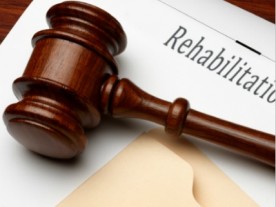Using Free Drug Intervention Programs to Help a Loved One into Inpatient Rehab
There are different types of free drug intervention programs which may be used to help a loved one into inpatient rehab. Many times, people who are addicted to drugs are not interested in rehab because of the stigma or for other reasons. They often insist that they can quit any time. With the help of drug intervention programs, people are often able to realize that they need something more than just willpower to stop abusing drugs.
Legal Drug Intervention Programs
Through the legal system, there are available intervention programs which could be helpful to your loved one. According to the Judicial Branch of the State of Connecticut, “The Drug Intervention Program handles many different kinds of cases where substance abuse is the main issue.” This is a program for patients who “are not violent and who are drug dependent” but who have done something illegal as a result of their drug abuse, usually abusing whatever illegal drug they were taking. The program consists of a “12 to 15 month period” where defendants:
- Report to the court
- “Receive orders, sanctions and incentives ordered by the judge”
- Receive daily supervision through alternative centers if necessary
- Submit to drug testing
“The court may recommend treatment and services, including detoxification, inpatient treatment, intensive outpatient treatment, and vocational and educational training.” Consider researching a legal program like this in your state if you would like help getting your loved one who may be in dealing with the legal issues of their drug abuse into an inpatient center through intervention.
Screening, Brief Intervention, and Referral to Treatment

Some states have programs that help send people to rehabilitation and treatment.
SBIRT is an “intervention approach to address risky use (counseling) and an opportunity to diagnose and refer patients to specialty treatment, all as covered services” (NDCP). It is an especially beneficial option for those who are seeking coverage for their inpatient rehab treatment. Patients are asked about their abuse of substances and then “provided a brief intervention or referral to treatment.”
Because this program should be covered by insurance, it will be free for your loved one to receive an analysis and counseling, should they need it. Then, the necessity for inpatient care will be assessed by the health care provider. “The Affordable Care Act ends discrimination against people with pre-existing conditions, including people with mental health and substance abuse disorders,” so this type of intervention can be used on someone with an addiction and with previous addiction treatment history.
The SBIRT program has helped to:
- Reduce alcohol and drug use 6 months after the patient receives the intervention
- Reduce risky behaviors in those who receive the intervention “including fewer unprotected sexual encounters”
- Improve quality of life
- Improve employment and education status
- Reduce past 30-day arrest rate
When your loved one is addicted to drugs, it can be very hard to decide what to do for them. The NIDA states that “treatment does not have to be voluntary to be necessary,” but through one of these types or another type of intervention programs, your loved one might come to realize how much inpatient treatment may benefit them, and programs like these can help assess the need for inpatient treatment and get your loved one the help they need.

 Are Drug Rehab Centers Free? -
For many people, drug addiction creates an array of financial struggles that can make paying for treatment even more challenging than ever. Finding free drug rehab, though challenging, is not completely out of the question—you just have to know where to look and what to look for. While the reality is that most rehab programs ...
Are Drug Rehab Centers Free? -
For many people, drug addiction creates an array of financial struggles that can make paying for treatment even more challenging than ever. Finding free drug rehab, though challenging, is not completely out of the question—you just have to know where to look and what to look for. While the reality is that most rehab programs ...  Is There Funding For Drug Rehab In My State? -
Many people who need drug rehab can't pay for it on their own, which is why most states offer funding for addiction treatment.
Is There Funding For Drug Rehab In My State? -
Many people who need drug rehab can't pay for it on their own, which is why most states offer funding for addiction treatment.  Finding Free Inpatient Drug Rehab Centers for A Loved One -
Learn how to find free inpatient drug rehab centers that provide the treatment and resources your loved one needs.
Finding Free Inpatient Drug Rehab Centers for A Loved One -
Learn how to find free inpatient drug rehab centers that provide the treatment and resources your loved one needs.  Where Can I Get Free Long Term Drug Rehab? -
Free long term drug rehab may seem too good to be true. It is common knowledge that addiction rehab facilities can be expensive as well as difficult to get into. While many individuals do decide to forgo treatment because of the cost, there is no reason to do so, as free long term drug rehab ...
Where Can I Get Free Long Term Drug Rehab? -
Free long term drug rehab may seem too good to be true. It is common knowledge that addiction rehab facilities can be expensive as well as difficult to get into. While many individuals do decide to forgo treatment because of the cost, there is no reason to do so, as free long term drug rehab ...  Are There Free Rehabs in Every State? -
Although most states provide some form of state-funded rehab, not all patients are eligible for these programs.
Are There Free Rehabs in Every State? -
Although most states provide some form of state-funded rehab, not all patients are eligible for these programs.